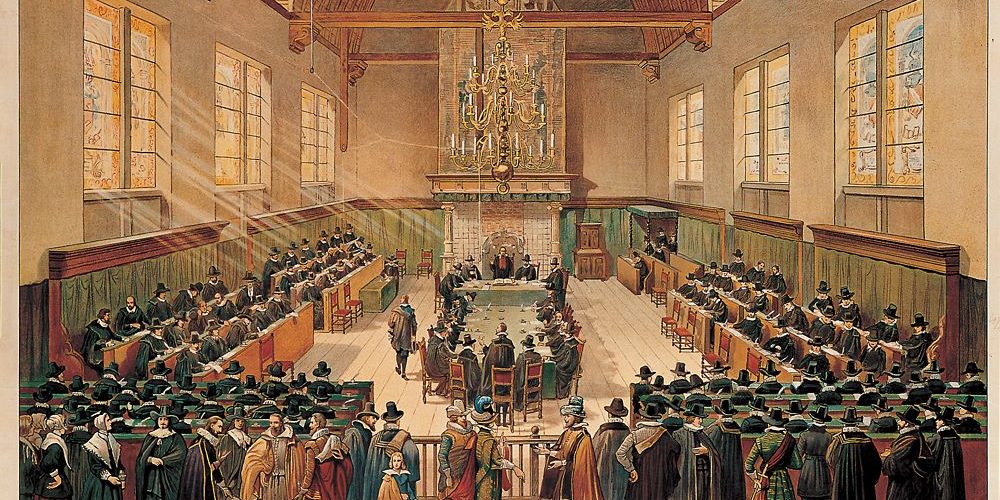
Definite Atonement at Dort and the Unity of the Trinity
The new issue of  Credo Magazine focuses on Dort at 400. The following is an excerpt from David Schrock’s article, “Definite Atonement at Dort and the Unity of the Trinity.” David Schrock serves as the Pastor of Preaching and Theology at Occoquan Bible Church in Woodbridge, Virginia. Additionally, Dr. Schrock is an adjunct professor of systematic theology at Indianapolis Theological Seminary as well as the Southern Baptist Theological Seminary. He received his B.A. at Albion College and his M.Div and Ph.D in Systematic Theology from The Southern Baptist Theological Seminary where he wrote his dissertation: “A Biblical-Theological Investigation of Christ’s Priesthood and Covenant Mediation with Respect to the Extent of the Atonement.” Dr. Schrock writes regularly for his blog, Via Emmaus.
Credo Magazine focuses on Dort at 400. The following is an excerpt from David Schrock’s article, “Definite Atonement at Dort and the Unity of the Trinity.” David Schrock serves as the Pastor of Preaching and Theology at Occoquan Bible Church in Woodbridge, Virginia. Additionally, Dr. Schrock is an adjunct professor of systematic theology at Indianapolis Theological Seminary as well as the Southern Baptist Theological Seminary. He received his B.A. at Albion College and his M.Div and Ph.D in Systematic Theology from The Southern Baptist Theological Seminary where he wrote his dissertation: “A Biblical-Theological Investigation of Christ’s Priesthood and Covenant Mediation with Respect to the Extent of the Atonement.” Dr. Schrock writes regularly for his blog, Via Emmaus.
“There is a strange idea abroad that in every subject the ancient books should be read only by the professionals, and that the amateur should content himself with the modern books.”[1]
So begins C.S. Lewis’s preface to On the Incarnation by Athanasius of Alexandria. In his essay, Lewis chastises modern readers for their obsession with novelty. He rightly calls for the reading of old books. And in his own, witty way Lewis presents the ancient words of Athanasius as an antidote to modern errors.
The Need for Depth
Though his words introduce Athanasius’s argument for Christ’s deity, I would suggest they could also apply to the Synod of Dort, which corrected the errors of Arminius. In our day, Reformed soteriology — a view of salvation that begins and ends with God’s grace — has been made widely available. With such ubiquity, however, comes the danger of theological superficiality. While Calvinists can tweet truth in 240 characters, our theology must go beyond slogans and hashtags. We need something older, something wiser, something more like the Canons of Dort.
Convened for six months in 1618–19, the Synod of Dort responded to the five points of the Remonstrants released in 1610. As disciples of Jacob Arminius, these “Arminians” argued for (1) conditional election, (2) universal atonement, (3) the corrupted state of sinful man,[2] (4) resistible grace, and (5) eternal insecurity. Historically, the Remonstrants originated the five point debate. The Synod of Dort responded in kind and produced a thorough confession, which after three centuries led to the well-known moniker — TULIP.[3]
Standing for Total Depravity, Unconditional Election, Limited Atonement, Irresistible Grace, and Perseverance of the Saints, these five points abbreviate — and obscure — the Canons of Dort. And as a result of this (mis)translation, I wonder how many modern Calvinists and defenders of the TULIP know what the Synod of Dort is or what the Canons of Dort are?
Thankfully, there are denominations and confessional organizations who have faithfully propagated this historical confession. But in our ahistorical world, there are others who argue for the five-points of Calvinism, or four-points or three. The denial of one or more petals on the TULIP indicates by itself how the doctrinal points of Calvinism have been lifted from their historical (not to mention biblical) source. In our day when confessions find less prominence, Calvinism has spread biblical truth, but at what cost?
In this article, I will argue for recovering the Canons of Dort in general and the second head of doctrine (“Of the Death of Christ, and the Redemption of Men thereby”) in particular. By considering Dort’s response to universal atonement, I will show how the second canon is a reliable and pastoral guide for answering questions about the atonement’s extent, one that is far better than its crude approximation (“Limited Atonement”).[4] Indeed, Dort’s sixteen-point article on the death of Christ is anything but a singular argument for limiting the atonement. It is a biblically-saturated, theologically-balanced, missions-minded manifesto which sets the cross in the doctrine of the Trinity and God’s eternal purposes for salvation. For this reason, we need to learn this ancient confession and see how it may still apply today.
Read David Schrock’s entire article in the new issue of Credo Magazine: Dort at 400.
Endnotes
[1] C. S. Lewis, “Preface” in Athanasius, On the Incarnation, Popular Patristic Series 44B (ed. John Behr; Yonkers, NY: St. Vladimir Seminary Press), 9.
[2] It has been observed that the third article is true by itself, but in error when read with the other articles. “The synod responded to the third and fourth points of the Remonstrance together because only the Arminian teaching on the resistibility of grace clearly shows that their apparently sound teaching on total depravity was not truly means.” W. Robert Godfrey, Saving the Reformation: The Pastoral Theology of the Canons of Dort (Orlando, FL: Reformation Trust, 2019), 127.
[3] Daniel Montgomery and Timothy Paul Jones, Proof: Finding Freedom through Intoxicating Joy and Irresistible Grace (Grand Rapids: Zondervan, ), 132–33, 210–11, provide a concise history of the TULIP’s origin. Cleland McAfee, Presbyterian pastor and theological professor, is reported to have originated the term in 1905.
[4] On the pastoral intentions of the Canons of Dort, see Godfrey, Saving the Reformation, 81–84. On the form of the Canons, he notes, “Each [canon] is written in a popular rather than a scholastic style” (ibid., 229).

